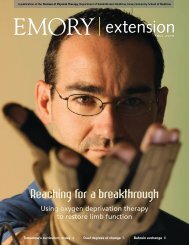medicine - Woodruff Health Sciences Center - Emory University
medicine - Woodruff Health Sciences Center - Emory University
medicine - Woodruff Health Sciences Center - Emory University
Create successful ePaper yourself
Turn your PDF publications into a flip-book with our unique Google optimized e-Paper software.
The healing power of progesterone<br />
More than 25 years ago, scientist Donald Stein (emergency<br />
<strong>medicine</strong>) noticed that female rats recovered better than male rats from<br />
brain injury. The brain researcher thought the difference for females was the<br />
effect of progesterone, but he found little interest in this theory among his colleagues,<br />
who told him not to waste his time.<br />
Still, he believed he was on to something, and he persisted. He spent<br />
decades doing his research in his spare time and with piecemeal funding.<br />
This past summer, he saw the fruits of his hard work when the medical school<br />
received $14.5 million in NIH funding to lead a phase III study in 15 states to<br />
evaluate the effectiveness of progesterone on patients with acute traumatic<br />
brain injury. Grady Hospital<br />
will serve as the lead center<br />
when the trial begins early<br />
this year.<br />
An earlier study, called<br />
ProTECT (progesterone for<br />
traumatic brain injury—experimental<br />
clinical treatment)<br />
yielded positive results. “We<br />
found a 50% reduction in mortality<br />
in those patients treated<br />
with progesterone,” says David<br />
Wright (emergency <strong>medicine</strong>),<br />
who also will lead the new<br />
study. “We also found signs<br />
that progesterone improved<br />
functional outcomes and<br />
reduced disability in patients<br />
with moderate brain injury.”<br />
Progesterone is naturally<br />
Donald Stein’s research, which<br />
began more than 25 years ago, is<br />
headed into a phase III study on the<br />
effectiveness of progesterone for<br />
traumatic brain injury.<br />
present in small but measurable<br />
amounts in human brains,<br />
and brain tissue is loaded<br />
with progesterone receptors.<br />
Laboratory studies suggest<br />
that progesterone is critical<br />
for normal development of neurons in the brain and exerts protective effects<br />
on damaged brain tissue. Approximately 1.5 to 2 million Americans suffer a<br />
traumatic brain injury each year, leading to 50,000 deaths and 80,000 new cases<br />
of long-term disability.<br />
“Many people do not realize that it’s not just a female hormone; both men<br />
and women produce progesterone directly in the brain as well as in other<br />
tissue,” says Stein, who directs the brain research lab in emergency <strong>medicine</strong>.<br />
“Ultimately, we learned that progesterone basically does in brain injuries what<br />
it also does during fetal development—protect cells and tissue. To now witness<br />
the translation of this laboratory research into a treatment that may have livesaving<br />
benefits is breathtaking.”<br />
Stein is continuing to research<br />
progesterone. In collaboration<br />
with Dennis Liotta, <strong>Emory</strong><br />
professor of chemistry and a<br />
codiscoverer of Emtriva for<br />
HIV, Stein has found some<br />
progesterone analogues that<br />
are water-soluble.<br />
Currently, lack of water solubil-<br />
ity limits delivery of progesterone.<br />
The hormone must be prepared<br />
hours ahead and cannot be kept<br />
at room temperature. Small chemi-<br />
cal modifications may allow similar<br />
compounds with the same effects as<br />
progesterone to be given to patients<br />
closer to the time of injury.<br />
According to his research, two<br />
compounds similar to progesterone<br />
reduced brain swelling just as well<br />
as progesterone did in an animal<br />
model of traumatic brain injury.<br />
Stein also has found that adding<br />
vitamin D to progesterone enhances<br />
the hormone’s effectiveness. Like<br />
progesterone, vitamin D is a steroid<br />
hormone that is inexpensive and<br />
safe and acts on many different bio-<br />
chemical pathways. A small amount<br />
of vitamin D boosted progesterone’s<br />
ability to protect neurons from<br />
excito-toxicity, a principal cause of<br />
brain injury and cell death.<br />
WINTER 2010 5
















